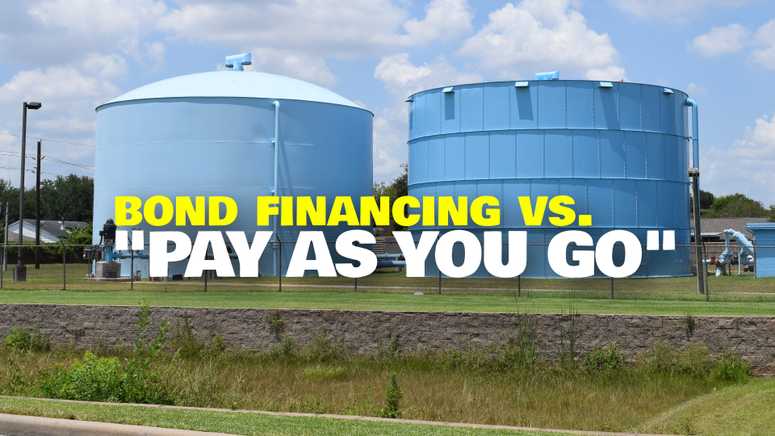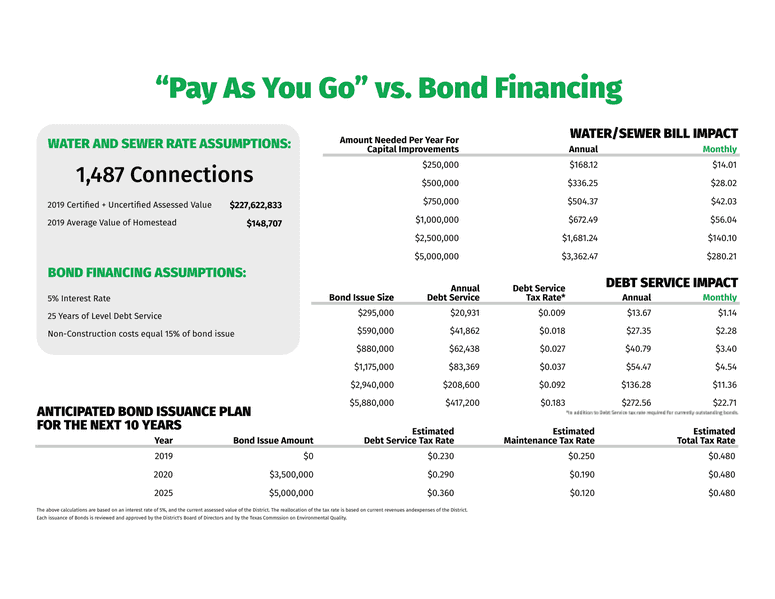Westlake Municipal Utility District 1 (Westlake MUD 1) has been responsible for providing water and sanitary sewer infrastructure for nearly 50 years. During that time, the community the District serves has grown to include about 1,250 homes and 45 businesses within the MUD's roughly 395 acres.
On November 5, residents of the District will be asked to vote in an election to determine whether the MUD will be authorized to issue bonds in several increments over time, as needed, to fund the maintenance, rehabilitation and upgrade of portions of the MUD's Water, Sewer, and Drainage infrastructure as it ages.
Aging WS&D Infrastructure
As the MUD's WS&D infrastructure ages, it requires maintenance, rehabilitation, and sometimes, replacement as part of its lifecycle. In order to serve the community properly, the MUD needs to maintain, repair, and replace infrastructure.
The MUD plans to upgrade our infrastructure in order to convert to surface water. This involves changing controls and the disinfection systems for our drinking water and wastewater plants and replacing iron pipes throughout the District that are aging and need to be replaced because they are old and deteriorating. The District also needs to repair and upgrade the community’s sanitary sewer system as well as several smaller maintenance projects over the next 15 years.
Long-Term Plan
Westlake MUD No. 1’s Board of Directors has worked with its engineering and financial advisors to develop a long-term capital improvement plan to proactively manage these projects. However, the costs of the required projects in this plan exceed the existing reserve funds and remaining bond authorization for WS&D projects. This is why the District’s Board of Directors of is asking for authorization for $17 million in additional bond authorization from residents to fund the necessary projects, including system upgrades, repairs and maintenance.enance.
These upgrades and repairs are necessary to provide consistent water, sanitary sewer, and drainage service to the community in the MUD over the next 30 years. The decision is not whether these projects must be done, but how the projects will be paid for.
Bond Financing vs. "Pay as You Go" with Cash
The two primary options available to the MUD for funding are (1) to spread the costs of the projects out over time through the issuance of bonds or (2) to pay for the projects with cash using a "pay as you go" approach requiring substantial increases in water and sewer bills. These projects must be completed in order to keep the District’s infrastructure operational, so the choice before voters in a bond election is how projects are paid for, not if the projects will move forward. These projects are necessary to provide water to residents.
As an example scenario to illustrate the cost difference between funding necessary work through bonds or with cash through increased water bills, consider the two financing options shown below to fund required WS&D capital improvement projects.
An example
To explain in more detail, take the first example in the chart of a hypothetical $1,000,000 WS&D capital improvement project.
The first option available to the MUD is to finance the project through bonds, which uses a financing model similar to what residents may have for their homes. Financing WS&D improvements using bonds, or a long-term loan, has the effect of spreading the cost over the useful life of such improvements. This allows the cost for the necessary workß to be spread out over a longer period of time and to be paid for by both current and future residents of the MUD. Assuming the financing terms included in the above chart, the bonds required to fund the $1,000,000 project would account for $54.47 of the property taxes for each residence in the MUD, or about $4.54 per month, for bonds sold at a 5% interest rate.
If the MUD is not able to issue bonds to spread the costs of this $1,000,000 project over time, the MUD would need to fund the project with cash through increased water bills. Under this option, Westlake MUD 1 residents would pay an additional $672.49 annually in their water and sewer bills, or about $56.04 each month. If the MUD is required to utilize this cash payment option for a project, it must have the entire project cost on deposit before it can award a construction contract for the project.
As the size of the required project grows, the dollar amounts required under each financing model grow proportionately. A $5,000,000 WS&D capital improvement project financed over time with bonds would account for $272.56 of the property taxes annually for each residence in the MUD, or about $22.71 each month. If paid for with cash using a "pay as you go" approach, this same $5,000,000 project would require an additional $3,362.47 annually in the water and sewer bills of residents, or about $280.21 each month.
Impact on the MUD's Total Tax Rate
Over the last six years, Westlake MUD 1 has lowered its total property tax rate by more than 17 percent, going from $0.593 per $100 in home value to $0.48 per $100 in value for the 2019 tax year.
If the requested WS&D bonds are authorized, the Board does not anticipate any increase in the MUD's total tax rate in the next 10 years as a result of the bonds. This projection is based on the following factors:
- The projected debt service requirements of the bonds to be issued to finance the improvement projects mentioned above over time.
- The scheduled need to issue bonds over an extended 15-year period rather than issuing all of the bonds in one lump sum.
- The reallocation of the tax rate from maintenance tax rate to debt service tax rate, maintaining the same total tax rate of $0.48 per $100 valuation.
As residents inform themselves regarding the bond election, they are encouraged to reach out to the District for any clarifications they might need by using the Contact Us form on the District’s website.
Did you find this article informative? Help keep your neighbors in the know by clicking the share button above to post to your favorite social media channels.

